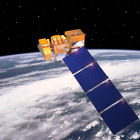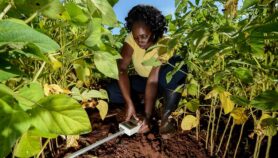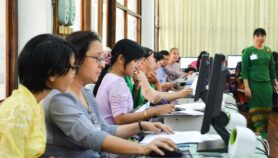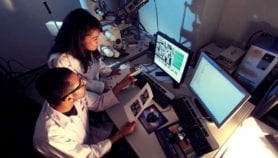By: Daniel Schaffer
Send to a friend
The details you provide on this page will not be used to send unsolicited email, and will not be sold to a 3rd party. See privacy policy.
Although massive amounts of data from sources such as Landsat have become open access, users still face many obstacles, says Daniel Schaffer.
Over the last 40 years, images from Landsat satellites have been painting a portrait of global changes in agriculture, forestry, urban development, wetlands, and soil and water resources.
The images have been invaluable for researchers seeking to solve some of the world’s most pressing problems. But until recently they were available only to those who could pay for them. Then, in 2008, the owners of the data — NASA and the US Geological Survey — agreed to provide free access to Landsat’s database. Usage soared a hundred-fold in the following year.
Open access is a milestone for a movement that seeks ways to exploit best the scientifically useful portion of the over 1,000 exabytes of data now existing in the world (one exabyte equals one billion gigabytes). But, as a recent symposium found, there are other hurdles to overcome before open access actually delivers.
Free access unlocks value …
For Landsat scientists, the lifting of the charges meant that, "for the first time we are finally getting our money’s worth", says Curtis Woodcock, professor of geography and environment at Boston University, United States.
His words may at first appear contradictory but Landsat was never a profitable enterprise. The fees had been generating just US$5 to US$10 million a year for a project that has cost a thousand times more, some US$5 to US$10 billion, to build and maintain since the early 1970s.
"There was no chance that the Landsat programme would ever generate sufficient revenues to pay for itself," Woodcock told a meeting, ‘The case for international sharing of scientific data: a focus on developing countries’, held by the US National Academy of Sciences earlier this year (18–19 April) in Washington DC.
This notion that the true value of data is only realised by making access free underpinned the meeting.
"It levels the playing field for researchers regardless of the country in which they live, and also contributes to economic development," says Roberta Balstad, co-chair of the US National Research Council’s Board on Research Data and Information, which organised the meeting together with the International Council for Science’s Committee on Freedom and Responsibility in the Conduct of Science (CFRS).
International organisations now voicing support for open access include the World Meteorological Organization, UNESCO (the UN Educational, Scientific and Cultural Organization), the European Union, the US National Science Foundation and the OECD (Organization for Economic Co-operation and Development).
And the roster of open access participants has expanded recently in both the public and private sectors, to include the Massachusetts Institute of Technology’s Open Source Initiative, India’s Open Source Drug Discovery programme and the Beijing Genomics Institute (BGI).
… but there’s no free lunch
Open access, however, is by no means free, even when sources such as Landsat waive their charges.
For example, there are financing and training issues. Satellites and high-bandwidth cables used to gather and transmit the data are expensive to build and maintain. In addition, data analysis and interpretation is a labour-intensive exercise that calls for highly educated and skilled researchers, statisticians and computer scientists.

Landsat generates lots of data but the high-bandwidth cables needed to transmit it are expensive to build and maintain
NASA)
Recent developments, including the laying of three submarine cables along the coast of Africa in the past year, have boosted data speeds four-fold and reduced prices by 90 per cent. This suggests that the hardware challenge is increasingly being met and will likely be overcome in the years ahead.
But, as Atta-ur-Rahman, former minister of science and technology and federal commissioner of higher education in Pakistan, has noted, many developing countries continue to "lack a critical mass of researchers to utilise the growing volume of data and information" that is now available.
There are also regulatory and policy issues concerning intellectual property rights and privacy, especially for data collected by private-sector firms used for acquiring international patents.
In addition, there are security concerns. Advocates of open access, says Balstad, are not proposing that institutions allow unfettered access to sensitive data that could place the security of a nation or the world at risk.
And then there are cultural issues within societies and professions. Some countries and institutions are more open than others. And all governments — not to mention private firms — hesitate to give free access to data and information that cost hundreds of millions, if not billions, of dollars to acquire and manage.
Meanwhile, the intensely competitive world in which scientists work sometimes makes researchers reluctant to share data for fear of not receiving credit for their accomplishments.
Seeds of success
Despite these obstacles, participants at the symposium saw reason for optimism. For example, Henry Yang, co-founder and president of the Beijing Genomics Institute, China, outlined the contributions that his institution has made to the sequencing of the genomes of rice, chickens, silkworms, pandas, cucumbers, maize, soybeans and an expanding list of micro-organisms, as a result of open access to genomic data.
Such success stories suggest that not only the volume and range of data, but also the number of scientists in developing countries utilising it, will continue to increase — although not as quickly as advocates would like.
As Yang observed in remarks highlighting the benefits of sharing: "The entire world has benefited from China’s initiatives, but it has been Chinese scientists who have benefited the most."
Farouk El-Baz, director of the Center for Remote Sensing at Boston University, United States, says: "When you make data available, it can make a huge difference to the quality of people’s lives.
"The benefits derived from data-based analysis and policies are likely to be most acutely experienced by people in developing countries. That’s why it’s so important to continue to expand free and open access to scientific data."
Daniel Schaffer is public information officer at TWAS, the academy of sciences for the developing world, in Trieste, Italy.













